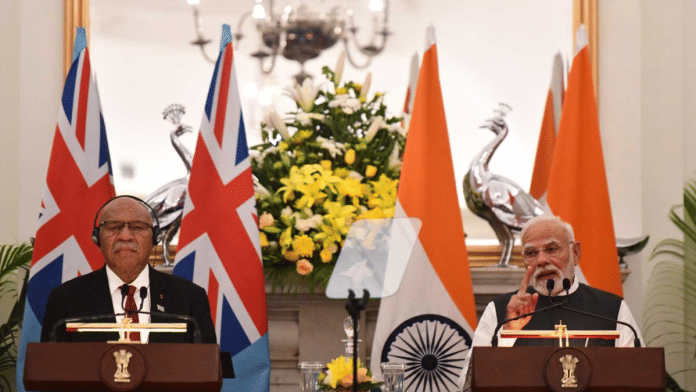New Delhi: India is stepping up its security presence across Pacific Island nations, announcing Monday the establishment of a defence wing at its high commission in Fiji, along with a cybersecurity training cell and the provision of two ambulances to the Fijian military.
New Delhi’s moves come as China continues to step up its presence within the Pacific Island states, in particular its security and economic engagements across the region, in recent years. The announcements regarding India’s deepening defence cooperation with Fiji were made during Fijian Prime Minister Sitiveni Rabuka’s visit to New Delhi.
“We have decided to strengthen mutual cooperation in the field of defence and security. An action plan has been prepared for this. To strengthen Fiji’s maritime security, India will provide training and equipment support. We are ready to share our experience in the areas of cybersecurity and data protection,” Prime Minister Narendra Modi said Monday in a statement to the press standing beside Rabuka.
Modi added that India sees Fiji as a ‘hub in cooperation’ with Pacific Island countries. “We both support a free, open, inclusive, safe and prosperous Indo-Pacific,” he added.
A joint statement, agreed to by both leaders, further highlights the importance of defence ties between the two countries. In 2017, India and Fiji had signed a memorandum of understanding (MoU) in the field of defence. Rabuka’s three-day visit to India, from 24 to 26 August, has given an impetus to the security partnership between New Delhi and Suva.
“Last month we had the first Joint Working Group meeting on defence cooperation. A number of areas were outlined for collaboration between the two countries. We have also announced the establishment of the post of a defence attaché in the High Commission in Fiji, who will be covering the Pacific islands as well,” explained Neena Malhotra Secretary (South) in the Ministry of External Affairs at a special briefing after the bilateral talks.
Malhotra added that there have been specific requests of “equipment” from Suva, which is being considered by New Delhi. Further, the focus at this stage, as Malhotra pointed out is on “capacity building” and increasing Suva’s maritime security capabilities.
“The leaders expressed satisfaction with the ongoing defence collaboration and reaffirmed their commitment to further strengthen these ties, emphasising the need to enhance defence and maritime security cooperation. Prime Minister Rabuka stressed the significance of ensuring security of Fiji’s Exclusive Economic Zone (EEZ) and welcomed India’s assurance to extend assistance to meet the security needs of the Republic of Fiji,” the joint statement said.
The statement added: “Both leaders reaffirmed their commitment to further deepening defence cooperation through new initiatives aimed at accelerating bilateral defence efforts and designed to promote mutual benefits and advance peace, stability, and prosperity in the region.”
China has long been keen to expand its footprint across the Pacific Island country. In February, Beijing announced the “Action Plan” for its comprehensive strategic partnership with the Cook Islands, another country in the Pacific. Further, China also signed a couple of other agreements, including on seabed mining.
A few days later, China conducted live-fire naval drills in the Tasman Sea, with no prior notification, that forced both Australia and New Zealand to reroute commercial planes at short notice. A Chinese-flagged hydrographic survey vessel was seen sailing south of Australia just a few weeks after the naval drills, as Beijing stepped up its activities in the region.
Solomon Islands, Kiribati and Nauru, other countries in the region have all snapped ties with Taiwan in the last decade, and in-return have received large sums of overseas aid from China.
Apart from the focus on defence and security, the talks between Modi and Rabuka spanned the entire gamut of ties, with at least nine agreements signed Monday including the construction of a super-speciality hospital in Fiji, on supply of medicines, cooperation in the field of standards, capacity building, grant assistance for quick impact projects (below $50,000 in cost) and declaration of intent for mobility.
The other areas under the scanner for cooperation include agriculture, training and in the cultural field. Fiji is home to a large number of people of Indian origin. Indo-Fijians account for roughly 37 per cent of the total population of around 900,000 in the country.
(Edited by Shashank Kishan)
Also Read: India is showing signs of trusting China again. Beijing sees a window of weakness






